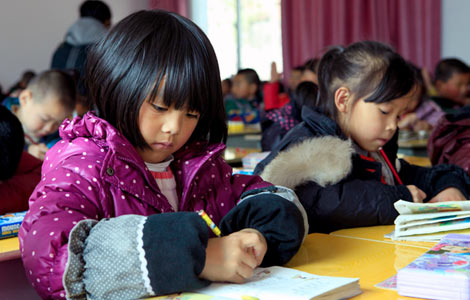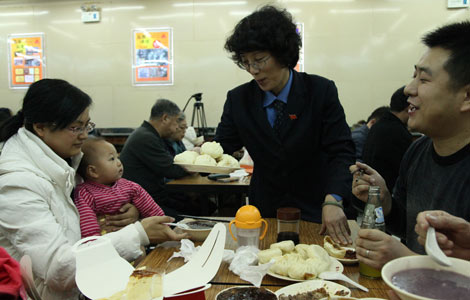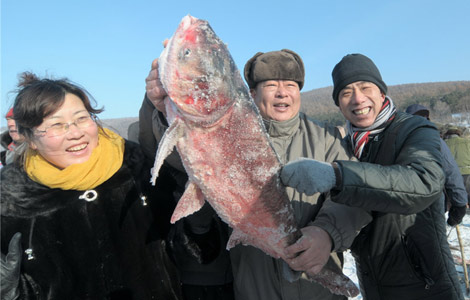A tricky conversation for Asian-American feminism
Updated: 2013-12-30 07:04
By KELLY CHUNG DAWSON in New York (China Daily USA)
|
||||||||
When the feminist hashtag #NotYourAsianSidekick quickly garnered 45,000 tweets over the holiday season in a conversation about the marginalization of Asian women, it also provoked the counter-hashtag #AsianPrivilege, which questioned whether Asian Americans could genuinely speak to the experience of discrimination.
"#NotYourAsianSidekick because I'm tired of the patriarchy in Asian-American spaces and sick of the racism in white feminism," tweeted Suey Park, an advocate for Asian-American feminism and the originator of the hashtag.
Among the critics of Park's Twitter-propelled movement was user NayNayCantStop, who wrote: "#AsianPrivilege means being overrepresented at universities then changing the narrative to make it like you [sic] oppressed," and later: "I'm all about having Asian allies, but not until they check their #AsianPrivilege. They [sic] richer than even whites."
The question of whether Asian Americans, who report a higher household income today than any other ethnicity in America, can claim knowledge of oppression is already a touchy subject. According to the White House's Initiative on Asian Americans and Pacific Islanders, 30-to-31 percent of all AAPIs report having experienced race-based discrimination in their careers, but as a group AAPIs are rarely acknowledged to be oppressed. For Asian American women, who on average earn $0.73 for every $1.00 earned by Asian men, the conversation can feel particularly tone-deaf.
Jenn Fang, an advocate for Asian American issues and founder of the site Reappropriate.co, believes that feminist issues have previously been largely silenced in the Asian-American community. Similar to the women who were discouraged from speaking about sexism in the African-American community during the civil rights movement, there is a wide-spread feeling that raising issues of sexism in the Asian-American community might weaken the position of Asian Americans at large, she said.
Many of the #AsianPrivilege-tagged tweets were posted by users identifying as black feminists, who earlier this year had as a group popularized the hashtag #SolidarityIsForWhiteWomen, in a previous discussion about the exclusiveness of white feminism. That this new discussion of Asian privilege originates with black feminists is indicative of a binary white-black privileged-oppressed understanding of race, Fang said.
"It's a fair argument that Asian Americans earn more than other minorities, but what we lose in that conversation is that what privilege we have does not negate the discrimination we also face in the workplace," Fang said. "The notion that privilege and oppression are mutually exclusive is a way of denying the Asian American experience of discrimination, and a means of saying that we're too privileged to have disadvantages."
Contrary to the popular narrative, Asian American women do experience discrimination in the workplace, as demonstrated by a disparity in pay and employment not only with their white counterparts but also when compared to Asian American men.
According to a National Science Foundation study of Asian-American women working in the science, technology, engineering and mathematics (STEM) fields, Asian-American women are proportionately represented in university acceptance and attendance, but by 13 years after graduation, much more likely to be unemployed and earning between $10,000 and $20,000 less than their male counterparts. Asian-American women experience the highest rate of unemployment of any ethnic group, male or female, working in the STEM fields.
That gap is in part due to increased poverty (and fewer opportunities) for Asian-American women, of whom 12.3 percent are living in poverty, as compared to 9 percent of Asian men, according to the Center for American Progress.
Statistics released by the US Department of Labor and Statistics indicate that the population of Asian-American women earning less than minimum wage has doubled in the last five years.
The NSF study, entitled Women, Minorities and Persons with Disabilities in Science and Engineering in 2013, provides a limited view of the Asian American female experience, but in a field in which Asian Americans are disproportionately represented, the numbers can be extrapolated to be more accurate than fields in which Asians are scarce, Fang believes.
She speculates that general difficulties in raising children play a role in the disparity of income and career success among Asian-American women.
Additionally, the fact that Asian-American men outnumber Asian-American women by double can create an environment in which women's opinions are less valued, she said. This isn't specific to the Asian-American experience, but it should be noted that Asian-American full-time faculty members are less likely to receive federal funding for research than their male counterparts. In fact, Asian-American men are more likely than any other ethnic group to receive funding in the STEM fields, according to the NSF study.
"These data are a clear indication to me that there's a conversation worth having about disadvantages Asian-American women — and women of other races — continue to face in the workplace," Fang said.
Most Viewed
Editor's Picks

|

|

|

|

|

|
Today's Top News
Beijing turns cold shoulder to Japan
Xi to direct carrying out of reform
China's sharp satellite goes live
Tainted farmland to be restored
Auto industry roars through 2013
Chinese economy to overtake US later than thought
China an historic opportunity: report
Outrage still festers over Abe shrine visit
US Weekly

|

|















